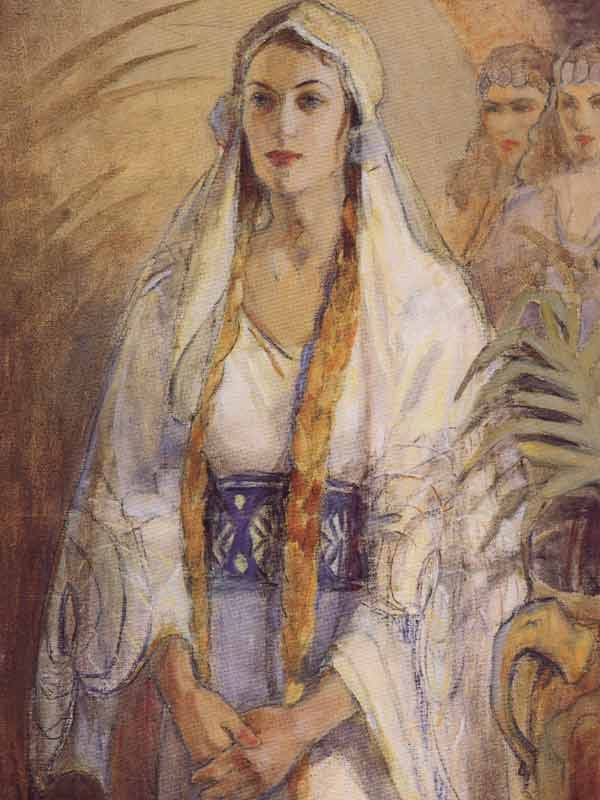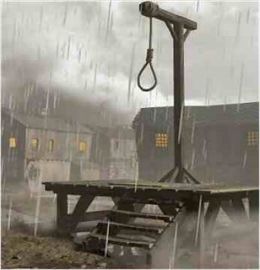Old Testament Commentary - Esther
by Don R. Hender
Esther ~ The Lord's hand is over the earth. While Xerxes rules the
Empire, his Queen wife is a daughter of Judah and her uncle Mordecai, a Jew, is to be the King's
chief advisor and next to the King in power and might. The pattern remains, the Lord looks after
and cares for his people, raising up men and women to insure the welfare of his people Israel in
the nations of the world. As it was in Egypt with Joseph, as in Persia here and as in the world in
general. All is under the hand and ministrations of God.
Chapters ~ Contents
1 ~ Ahasuerus [Xerxes/'Serse'] King
of Persia and Media from India to
Ethiopia - over 127 provinces.
|
6 ~ The King honors Mordecai for
exposing plot against the king. Haman
is upset. His wife advises him poorly.
|

|
2 ~ Esther is chosen new queen as
Mordecai befriends the king and
exposes a plot against him.
|
7 ~ Haman advises king on degree to kill
all Jews. Esther exposes Haman's plan
as treason against Mordecai and Queen.
|
3 ~ Mordecai refuses to obeisance
to Haman, and Haman arranges a
degree to kill all Jews in kingdom.
|
8 ~ King further honors faithful
Modecai with Haman's position and
wealth. He cancels and reverses decree.
|
4 ~ Jews fear and mourn the degree.
Esther dares to enter in before King
to make supplication for her people.
|
9 ~ While the King had hung Haman
on the gallows, the Jews allowed to
retaliate and kill Haman's 10 sons.
|
5 ~ Esther devises a feast and invites
Haman that she may expose him.
Haman thinks the feast is to his honor.
|
10 ~ Mordecai, a Jew, stands next to
Ahasuerus [Xerxes] as advisor and
in power and might.
|
A General Observation Concernings the Transitions of Events
From the days of captivity in Babylon to the days of either returning to Jerusalem to rebuild the
city and the themple and then to further secure the city by those so permitted to be involved, to
when those Jews who remained in the lands of the Empires; there is a pattern of interest afoot by
the powers of the Lord for the care and presurvation of Israel, the Lord's people. Such as Daniel
was among the first to be installed by the Lord's hand and raised up to his high position in the
kingdom of Nebuchadnezer, his ruling heirs and eventually even a smooth transition of Daniels
involvement in the new Persian Empire. Indeed a grand burial site is kept and maintained in Susa
even today which is said to be that final resting place of the great Daniel of the Jews.
By the records of the Jews was the name of Cyrus to be found as to his role is 'servicing' the
Jews of his kingdom, even to the providing for a group of such Jews to return to Jerusalem to
reestablish Jerusalem and rebuild the Temple, the House of Jehovah. And next with later rules
involvement, Nenemiah furhter returned to secure the city within a protective wall which would
aid in protecting the workers of the people in their labors of reconstruction. And then would
come the day when the enemies of the Jews in the kingdom would raise their heads of hatred and
envy against the Jews to the point of seeking the utter extinction of the Jews throuoghout the
kingdom of Xerxes. To this end was the likes of Mordecai and his adopted kinswoman Ester raised
up to serve to protect the people of the Lord, that is the Jews in the lands of the kingdom of
Persian.
Such are the little records of Ezra, Nehemiah, Esther, Zechariah and others entered into the records
of the Jews of these very important and high events of the presurvation of the Jews in their days
from the dangers in the lands of captivity and their deliverences from thence. And thus it is with
the book of Esther. It is such as this which is covered in relative to the story of Esther.
A Servant Is to Serve His Master
He Is Not to Raise Himself Up unto Power
And 'Whether We Serve God or Our Fellow Man
It Is the Same' so Reflected King Benjamin
A simple principle to learn is that if you are there to 'serve',
whether it be as a slave, servant or even a paid employee or service man, then you are there to
provide service and serve. You are not to preempt such service and devotion with seeking to raise
yourself up and to gain advantage or see to seek how you can over charge and rip he you serve off.
While this seems today to be an admired characteristic of the ambitious and the self-serving end of
many a 'service ended' advertising company to so provide a service at a 'fair price', it is very
much contrary to the concept of giving true service, and equitible proper service. Taking advantage
and over charging and seeing just how much you can get away with IS NOT 'SERVICE'. And you are NOT
in the service of your fellow man when you are rather engaged in the process of ripping him off.
There is just not enough truely honest souls of integrity in the world today and way too many who
are the self-centered and self-serving persons who are NOT there to service, but rather they are
there to see just how much they can take you for. Even if be your life as in the case of Haman.
Haman's responsibility of service to his 'master' [or customer] was not to his 'master's' best
end and interests. It was rather only motivated for Haman to see what he could get for himself in
the deal. You do not serve your king [or customer] by seeking to kill off his people for your own
gain and profit or robbing him of what is his by extracting unreasonable payment and consideration
to another's lose and your own selfish gain. That is in this case how Haman was using the king's
kingdom, destroying it for self agrandizement, an act of treason. That is rather than doing what is
good for the king's kingdom, you are destroying it for the purposes of your own gain and benefit.
 In a very personal application and practical sense, there is a lesson in the book of Esther which it
would be well that we all come to learn and understand. In life we all serve our King or kings if
you will. 'For when you are in the service of your fellowman, you are only in the service of your
God and King.' And how we serve, in each of our cases, most often serving one another, has a
relationship to that which we are building as our reward to come. What Haman was building was a
gallows for his brother, his neighbor, Mordecai. And he gained his reward, which he had built. So
now, what are each of us building for ourselves as our reward in our dealings with our fellowmen?
In a very personal application and practical sense, there is a lesson in the book of Esther which it
would be well that we all come to learn and understand. In life we all serve our King or kings if
you will. 'For when you are in the service of your fellowman, you are only in the service of your
God and King.' And how we serve, in each of our cases, most often serving one another, has a
relationship to that which we are building as our reward to come. What Haman was building was a
gallows for his brother, his neighbor, Mordecai. And he gained his reward, which he had built. So
now, what are each of us building for ourselves as our reward in our dealings with our fellowmen?
Back to Commentary Index of all Scriptural Books.
rev. 5 November 2014

 In a very personal application and practical sense, there is a lesson in the book of Esther which it
would be well that we all come to learn and understand. In life we all serve our King or kings if
you will. 'For when you are in the service of your fellowman, you are only in the service of your
God and King.' And how we serve, in each of our cases, most often serving one another, has a
relationship to that which we are building as our reward to come. What Haman was building was a
gallows for his brother, his neighbor, Mordecai. And he gained his reward, which he had built. So
now, what are each of us building for ourselves as our reward in our dealings with our fellowmen?
In a very personal application and practical sense, there is a lesson in the book of Esther which it
would be well that we all come to learn and understand. In life we all serve our King or kings if
you will. 'For when you are in the service of your fellowman, you are only in the service of your
God and King.' And how we serve, in each of our cases, most often serving one another, has a
relationship to that which we are building as our reward to come. What Haman was building was a
gallows for his brother, his neighbor, Mordecai. And he gained his reward, which he had built. So
now, what are each of us building for ourselves as our reward in our dealings with our fellowmen?